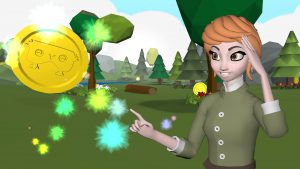Last week, Floreo was on the road to Denver, Colorado for the annual meeting of the Association for Behavior Analysis International (ABAI) event that brings together thousands of leaders in autism spectrum disorder clinical management who are interested in behavior analysis. At the conference, the Floreo team met with ABA therapists from around the globe on innovative approaches to using virtual reality in ABA practices. This growing usage of ABA training applications that systematically integrate Floreo into therapy sessions is an important component of the evidence-base that is emerging for VR augmented ABA therapy.
There have been some exciting results from several research projects that incorporated Floreo that were presented at ABAI and we are pleased to highlight them.
Researchers Katie Kariel and Einar Ingvarsson at the University of Virginia and Virginia Institute of Autism have been conducting single case studies evaluating the use of Floreo lessons in the acquisition and generalization of peer social skills. In their ongoing study, results from ABA therapy sessions with two children with autism spectrum disorder diagnoses ages 6 and 9 used Floreo in therapy sessions with objectives designed to address greetings, joining/initiating a conversation, and inviting peers to join a conversation. The Floreo lessons used in this research included joint attention, gestures, community and daily living skills, social interaction with peers, descriptive language, emotional regulation, safety, infrequent events (e.g., trick-or-treat, airport security). Read more about these lessons in Floreo's lesson library.
The results of their study showed that both children acquired the skills in the desired areas using the Floreo lessons. Mastery was achieved in each case between 6 and 11 lessons. Future directions of the research in peer social skills will evaluate the effect of Floreo integration into ABA therapy on interpersonal interactions as well as other dimensions of ABA development with complementary Floreo lessons.
An innovative application of Floreo for inpatient yoga lessons to support autistic adults and children with high support needs was conducted at Bancroft. Tracy Kettering, Jeffrey Schram, and Karen Lindgren conducted a controlled treatment study evaluating the user acceptance and favorability between VR and television programming using Floreo’s yoga instruction lesson.
In a study of 5 subjects using paired-assessment, concurrent chains preference assessment, it was shown that users preferred VR over TV delivery of yoga and all users had high levels of activity engagement. These results were encouraging for designing relaxation strategies into ABA care.
Members of Floreo’s own research team in partnership with Dr. Joseph McCleery of the Kinney Center for Autism Education and Support at St. Joseph’s University presented an in-depth analysis addressing the alignment of Floreo lessons with ABA therapy principles. The aim of the research is to develop and apply a systematic evaluation procedure to determine the ability of a particular technology-based intervention program to be implemented within the scope of applied behavior analytic practice. In this work, ABA clinicians evaluated 40 Floreo lessons and classified them the degree of fulfillment of the lessons in attaining ABA lesson criteria. The results showed that 17 of the 40 lessons are ABA compliant, with 5 of these Lessons scoring higher on immediate applicability, and the remaining 12 Lessons requiring small-scale coach-led modification of the lesson in order to be implemented within the scope of ABA practice.
The current findings serve to confirm that a number of Floreo lessons are compliant with the core principles of ABA and are, therefore, within the scope of ABA practice. Use of this standardized framework will help Floreo establish an approach to support ABA clinicians select lessons that are geared to assist Learners in achieving milestones in their treatment plan.
Collectively, the results of these research projects presented at ABAI show the emerging ways that ABA clinicians are obtaining results with meaningful outcomes that reflect the impact of Floreo lessons designed with ABA therapy principles. Collectively, Floreo is now showing the ways that the diverse curriculum is achieving value through targeted approaches to meet clinical needs. As Vijay Ravindran remarked at the conference, “Floreo is on the leading edge of designing virtual learning experiences that are built on fundamental principles of established ABA practices to create meaningful benefits for persons affected by ASD, their experts, and caregivers. We appreciate the important contributions that our
collaborators are making through the rigors of research conducted in ABA settings.” Floreo encourages researchers interested in research partnerships to explore our collaboration activities here.



.png)


-1.png?width=550&height=250&name=Untitled%20(3)-1.png)